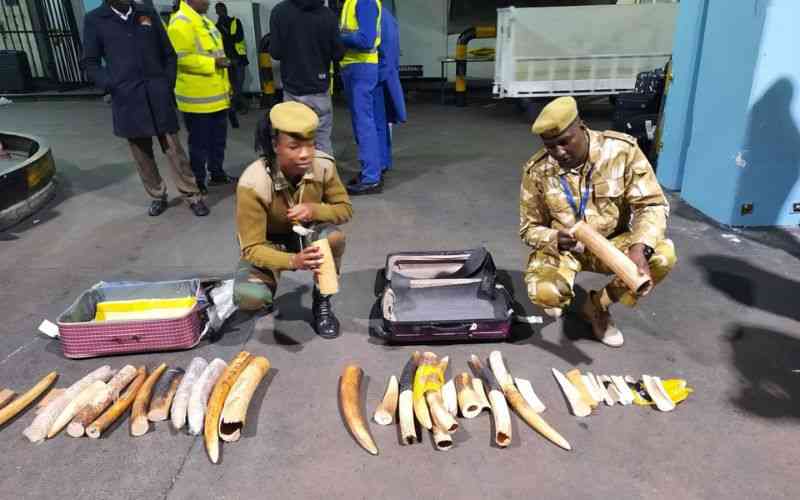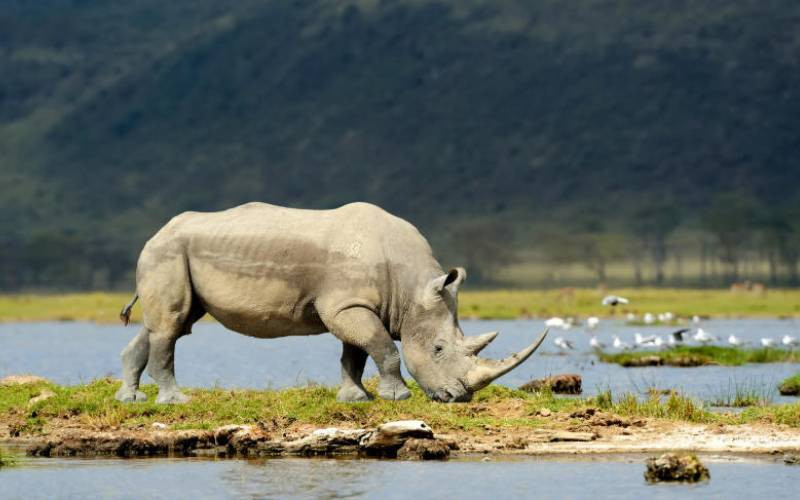 |
|
Some of the ivory worth Sh33.8 million that was intercepted at JKIA Swissport Cargo on its way to Malaysia on Friday. KRA officials intercepted the ivory after documents indicated they were dogs being transported. [PHOTO: BONIFACE OKENDO/STANDARD] |
NAIOBI, KENYA: The 260-kilogramme ivory intercepted by customs officials at the Jomo Kenyatta International Airport last Friday was packaged in Kisumu, police investigations revealed.
The Sh33 million contraband, headed for Kuala Lumpur in Malaysia, was painted with red and black oxide to confuse sniffer dogs and wrapped in 12 carton boxes disguised as wood carvings.
Police pursuing the matter said even though no arrest had been made, their probe shows the cargo was packaged in Kisumu.
Airport CID boss Joseph Ngisa said they had established the place where the packaging was done and were pursuing those behind it.
"They originated from Kisumu but we do not know if they were from animals killed in Kenya or elsewhere. We are pursuing that," said Ngisa.
He added they had established the owner of the cargo is a Chinese national.
Kenya Revenue Authority officials manning the customs desk at the Swissport Cargo centre at JKIA intercepted the ivory after documents indicated they were dogs being transported. But the cargo did not correspond to the animals.
Officials became suspicious of the papers presented by a clearing and forwarding agent, prompting further inspection.
A fortnight ago, two men were arrested and 22 pieces of ivory weighing 95 kilogrammes and valued at Sh950,000 recovered from them along the Nairobi-Nakuru Highway.
The men, both Kenyans, were in a salon car headed for Kampala, Uganda, but were intercepted at the Gilgil Weighbridge.
Last week, armed gangs killed four rhinos for their horns in the private Ol Jogi ranch near Nanyuki. This has been described as the worst rhino poaching incident in the country in more than 25 years.
The rhino bodies were found on two separate sites on the 58,000-acre ranch and the poachers escaped with three of the animals' eight horns.
Poaching in the region is on the rise as armed criminal gangs kill elephants for tusks and rhinos for horns, usually to be shipped to Asia to make ornaments and medicines.
In efforts to curb the crime, Kenya is using high-tech surveillance equipment, including drones, to track poachers and keep tabs on elephants and rhinos roaming national parks.
Stay informed. Subscribe to our newsletter
 The Standard Group Plc is a
multi-media organization with investments in media platforms spanning newspaper
print operations, television, radio broadcasting, digital and online services. The
Standard Group is recognized as a leading multi-media house in Kenya with a key
influence in matters of national and international interest.
The Standard Group Plc is a
multi-media organization with investments in media platforms spanning newspaper
print operations, television, radio broadcasting, digital and online services. The
Standard Group is recognized as a leading multi-media house in Kenya with a key
influence in matters of national and international interest.
 The Standard Group Plc is a
multi-media organization with investments in media platforms spanning newspaper
print operations, television, radio broadcasting, digital and online services. The
Standard Group is recognized as a leading multi-media house in Kenya with a key
influence in matters of national and international interest.
The Standard Group Plc is a
multi-media organization with investments in media platforms spanning newspaper
print operations, television, radio broadcasting, digital and online services. The
Standard Group is recognized as a leading multi-media house in Kenya with a key
influence in matters of national and international interest.








